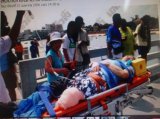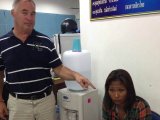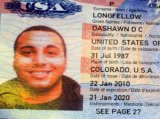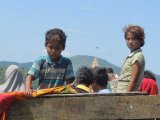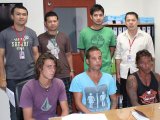PHUKET: Thai authorities should promptly and transparently investigate a spate of killings of ethnic Malay Muslims in the southern provinces, Human Rights Watch said today.
The government's failure to prosecute those responsible for such killings has fed a deadly cycle of reprisal attacks by alleged government forces and secessionist insurgents.
Since May 2013 at least six ethnic Malay Muslims, some suspected insurgents, have been killed by gunmen possibly linked to the state security forces.
''The killing in southern Thailand goes on but officials do little to bring those responsible to justice, especially when the victim is a Malay Muslim,'' said Brad Adams, Asia director at Human Rights Watch.
''The failure to prosecute these killings is widely interpreted in Muslim communities as a government attempt to cover up for state security forces and protect them from criminal responsibility.''
On August 14, 2013, gunmen firing assault rifles killed Abdulrofa Putaen, a prominent Malay Muslim leader, in Yarang district, Pattani province.
Abdulrofa, 48, was a former member of Pattani's provincial council and owner of the Patibattham school. He had taught for 10 years at the Thamma Wittaya school in Yala province, which authorities have labeled as the ''birthplace'' of the new generation of separatist insurgents.
Thai authorities in the past had accused him of taking part in the separatist insurgency and having close ties to a leader of the separatist Barisan Revolusi Nasional movement.
Abdulrofa told his family and friends that he was fearful for his life, especially after the killing of his wife's uncle Isma-ae Pa-omanee, an Islamic religious teacher in the same village, on June 25, 2013.
On August 21 at about 8.30am, unidentified gunmen shot and killed Islamic religious teacher Humaidi Musor, 38, while he was driving to the Islamic Community Foundation school in Nong Jik district, Pattani province.
Humaidi had served for years as the chairman of Nong Jik district's Pusaka Center, which oversees village-based elementary Quranic schools.
There have been several other recent killings of ethnic Malay Muslims who had previously been charged with insurgency-related offenses, Human Rights Watch said.
On July 27, gunmen with assault rifles shot and killed Islamic religious teacher Ahama Dorloh in front of his house in Yala province's Betong district.
On May 10, gunmen armed with AK-102 assault rifles - standard weapons of the Interior Ministry's Volunteer Defense Corps militia - shot and killed suspected insurgent Lukman Dorloh and his 12-year-old brother, Muhammadpusao Dorloh, as they were traveling in a pickup truck in Pattani province's Kapo district.
The victims' families and communities, together with local human rights groups, have publicly called on the Thai authorities to investigate these cases and hold the perpetrators to account.
These killings of Malay Muslims have prompted widespread fears among the Thai Buddhist population about possible retaliatory attacks by insurgents.
On August 19, insurgents shot and killed Athikom Tiwong, a teacher from the government-run Ban Prajan school in Pattani province's Muang district, as he was traveling on his motorcycle along the Pattani-Yala highway.
Leaflets were found at the scene linking the attack with Abdulrofa's killing. The leaflets also threatened more attacks against Thai Buddhists to avenge the killing of Malay Muslims.
Successive governments have failed to bring to justice government officials responsible for rights abuses, Human Rights Watch said.
There have still been no successful criminal prosecutions of any member of Thai security forces for human rights violations in the conflict in the southern border provinces.
In May 2012, Prime Minister Yingluck Shinawatra told the Thai parliament that, ''To bring back peace, security, and safety to people in the southern border provinces, the government will??? ensure that justice is provided fairly and evenly.''
''Building trust with the Muslim community requires that the government respond to killings with the aim of finding the truth,'' Adams said.
''Prime Minister Yingluck Shinawatra said justice is key to ending the killing in the south. Now she should turn her words into action.''
In responding to scores of killings over the past nine years, inquiries by the police and the Southern Border Provinces Administration Center have proceeded very slowly and shown little concrete result, Human Rights Watch said.
Officials often fail to keep the families of victims apprised of any progress in the investigation, compounding the family's frustrations.
In some cases, such as that of Abdulrofa, financial reparations were paid to the victims' families. But offering money to families of victims should not be considered a substitute for justice, Human Rights Watch said.
The extensive powers and near-blanket immunity provided to state security forces who commit human rights violations has generated frustration, alienation, and anger in the ethnic Malay Muslim community.
Human Rights Watch has repeatedly condemned violations of international humanitarian law, or the laws of war, by insurgents and Thai security forces in Thailand???s southern border provinces.
The laws of war specifically prohibit attacks against civilians, including reprisal attacks. The Fatoni [Pattani] Fighter (also known as Pejuang Kemerdekaan Fatoni) insurgents in the loose network of the Barisan Revolusi Nasional use state-sponsored abuses and heavy-handed counterinsurgency tactics to recruit new members and justify their campaign of violence and terror, which has claimed more than 5000 lives since January 2004.
''Past abuses provide absolutely no justification for retaliatory attacks against civilians,'' Adams said.
''The situation in Thailand's south is a tragic replay of abuses and violence committed by both separatists and Thai security forces.''
The government's failure to prosecute those responsible for such killings has fed a deadly cycle of reprisal attacks by alleged government forces and secessionist insurgents.
Since May 2013 at least six ethnic Malay Muslims, some suspected insurgents, have been killed by gunmen possibly linked to the state security forces.
''The killing in southern Thailand goes on but officials do little to bring those responsible to justice, especially when the victim is a Malay Muslim,'' said Brad Adams, Asia director at Human Rights Watch.
''The failure to prosecute these killings is widely interpreted in Muslim communities as a government attempt to cover up for state security forces and protect them from criminal responsibility.''
On August 14, 2013, gunmen firing assault rifles killed Abdulrofa Putaen, a prominent Malay Muslim leader, in Yarang district, Pattani province.
Abdulrofa, 48, was a former member of Pattani's provincial council and owner of the Patibattham school. He had taught for 10 years at the Thamma Wittaya school in Yala province, which authorities have labeled as the ''birthplace'' of the new generation of separatist insurgents.
Thai authorities in the past had accused him of taking part in the separatist insurgency and having close ties to a leader of the separatist Barisan Revolusi Nasional movement.
Abdulrofa told his family and friends that he was fearful for his life, especially after the killing of his wife's uncle Isma-ae Pa-omanee, an Islamic religious teacher in the same village, on June 25, 2013.
On August 21 at about 8.30am, unidentified gunmen shot and killed Islamic religious teacher Humaidi Musor, 38, while he was driving to the Islamic Community Foundation school in Nong Jik district, Pattani province.
Humaidi had served for years as the chairman of Nong Jik district's Pusaka Center, which oversees village-based elementary Quranic schools.
There have been several other recent killings of ethnic Malay Muslims who had previously been charged with insurgency-related offenses, Human Rights Watch said.
On July 27, gunmen with assault rifles shot and killed Islamic religious teacher Ahama Dorloh in front of his house in Yala province's Betong district.
On May 10, gunmen armed with AK-102 assault rifles - standard weapons of the Interior Ministry's Volunteer Defense Corps militia - shot and killed suspected insurgent Lukman Dorloh and his 12-year-old brother, Muhammadpusao Dorloh, as they were traveling in a pickup truck in Pattani province's Kapo district.
The victims' families and communities, together with local human rights groups, have publicly called on the Thai authorities to investigate these cases and hold the perpetrators to account.
These killings of Malay Muslims have prompted widespread fears among the Thai Buddhist population about possible retaliatory attacks by insurgents.
On August 19, insurgents shot and killed Athikom Tiwong, a teacher from the government-run Ban Prajan school in Pattani province's Muang district, as he was traveling on his motorcycle along the Pattani-Yala highway.
Leaflets were found at the scene linking the attack with Abdulrofa's killing. The leaflets also threatened more attacks against Thai Buddhists to avenge the killing of Malay Muslims.
Successive governments have failed to bring to justice government officials responsible for rights abuses, Human Rights Watch said.
There have still been no successful criminal prosecutions of any member of Thai security forces for human rights violations in the conflict in the southern border provinces.
In May 2012, Prime Minister Yingluck Shinawatra told the Thai parliament that, ''To bring back peace, security, and safety to people in the southern border provinces, the government will??? ensure that justice is provided fairly and evenly.''
''Building trust with the Muslim community requires that the government respond to killings with the aim of finding the truth,'' Adams said.
''Prime Minister Yingluck Shinawatra said justice is key to ending the killing in the south. Now she should turn her words into action.''
In responding to scores of killings over the past nine years, inquiries by the police and the Southern Border Provinces Administration Center have proceeded very slowly and shown little concrete result, Human Rights Watch said.
Officials often fail to keep the families of victims apprised of any progress in the investigation, compounding the family's frustrations.
In some cases, such as that of Abdulrofa, financial reparations were paid to the victims' families. But offering money to families of victims should not be considered a substitute for justice, Human Rights Watch said.
The extensive powers and near-blanket immunity provided to state security forces who commit human rights violations has generated frustration, alienation, and anger in the ethnic Malay Muslim community.
Human Rights Watch has repeatedly condemned violations of international humanitarian law, or the laws of war, by insurgents and Thai security forces in Thailand???s southern border provinces.
The laws of war specifically prohibit attacks against civilians, including reprisal attacks. The Fatoni [Pattani] Fighter (also known as Pejuang Kemerdekaan Fatoni) insurgents in the loose network of the Barisan Revolusi Nasional use state-sponsored abuses and heavy-handed counterinsurgency tactics to recruit new members and justify their campaign of violence and terror, which has claimed more than 5000 lives since January 2004.
''Past abuses provide absolutely no justification for retaliatory attacks against civilians,'' Adams said.
''The situation in Thailand's south is a tragic replay of abuses and violence committed by both separatists and Thai security forces.''

